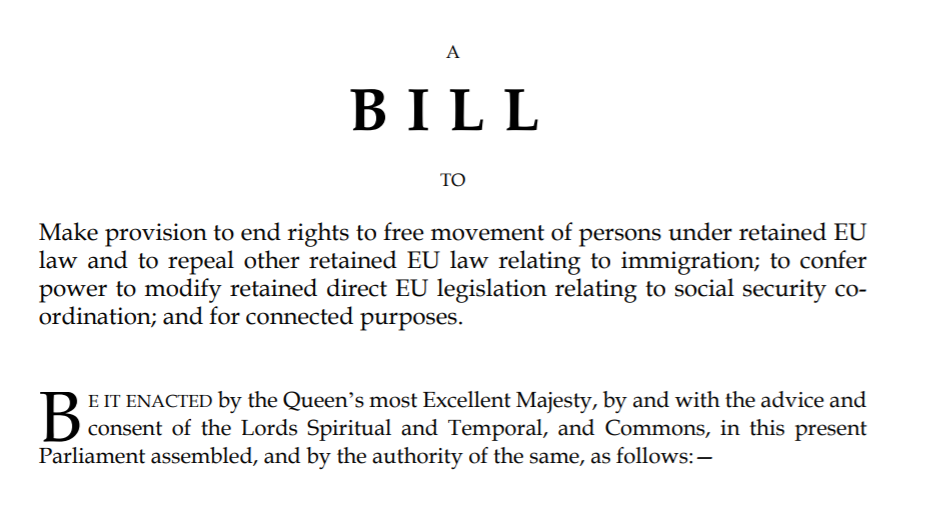
Ministers will launch a fresh attempt to repeal EU freedom of movement rules in the UK as flagship immigration legislation appears before MPs.
The Immigration and Social Security Co-ordination (EU Withdrawal) Bill is part of the move towards the Government’s new points-based immigration system, to be introduced from 2021, although it does not set out the details on this.
These will be fleshed out in the immigration rules, which will explain the future system for EU and non-EU nationals who move to the UK after the Brexit transition period ends on December 2020.
READ MORE: Opposition MPs write to EU negotiator to seek Brexit talks extension
 Home Secretary Priti Patel (Dominic Lipinski/PA)
Home Secretary Priti Patel (Dominic Lipinski/PA)
The Bill will be debated at second reading on Monday and then make its way through the parliamentary process.
It was previously introduced in the Commons in December 2018 but stalled weeks later as then prime minister Theresa May’s minority administration lacked the numbers to win key Brexit-linked votes.
Prime Minister Boris Johnson brings it back with an 80-seat majority but amid pressure for the immigration rules to support those dubbed “key workers” during the coronavirus pandemic.
A YouGov poll, for the Joint Council for the Welfare of Immigrants (JCWI), suggested 54% of Britons would support loosening immigration restrictions for workers who were defined as essential during the crisis.
READ MORE: Brexit trade talks timeline ‘virtually impossible’, says Deputy Irish Premier Simon Coveney
The Government’s list of critical workers includes people in the food production and processing industry, such as delivery drivers, those working in waste disposal and more.
In February the Government announced proposals for the new system, with points awarded for specific requirements such as being able to speak English to a certain level, having a job offer from an approved employer and meeting a salary threshold of £25,600.
Other points could be awarded for certain qualifications and if there is a shortage in a particular occupation.
A visa allowing doctors, nurses and health professionals from overseas to work in the NHS was introduced in March.
 An extract from the first page of the Immigration and Social Security Co-ordination (EU Withdrawal) Bill (PA)
An extract from the first page of the Immigration and Social Security Co-ordination (EU Withdrawal) Bill (PA)
Ahead of the Bill’s return to the Commons, Home Secretary Priti Patel said in a brief statement: “This historic piece of legislation gives the UK full control of our immigration system for the first time in decades and the power to determine who comes to this country.
“Our new points-based system is firmer, fairer, and simpler.
“It will attract the people we need to drive our economy forward and lay the foundation for a high wage, high skill, high productivity economy.”
Labour frontbencher Alison McGovern, however, said the Government needed a different approach.
She told the BBC: “We need to look at the system that we have for social care (and) ask ourselves: how are we going to improve the pay, improve the conditions, make sure that we’ve got a good number of people coming in to work in social care? And work out our immigration policy along with that aspiration to have skilled, well-paid people working in social care.”
Elsewhere, Satbir Singh, chief executive of the JCWI, called for further changes and said: “The fight against Covid-19 has shown us all just how much our survival and wellbeing depends on our key workers.
“So many of them have come from other countries and help keep this one running.
“Bus drivers and lorry drivers, care workers and shop workers, nurses and cleaners – they are not ‘unskilled’ or unwelcome, they are the backbone of our country and they deserve the security of knowing that this place can be their home too.”


Why are you making commenting on The Herald only available to subscribers?
It should have been a safe space for informed debate, somewhere for readers to discuss issues around the biggest stories of the day, but all too often the below the line comments on most websites have become bogged down by off-topic discussions and abuse.
heraldscotland.com is tackling this problem by allowing only subscribers to comment.
We are doing this to improve the experience for our loyal readers and we believe it will reduce the ability of trolls and troublemakers, who occasionally find their way onto our site, to abuse our journalists and readers. We also hope it will help the comments section fulfil its promise as a part of Scotland's conversation with itself.
We are lucky at The Herald. We are read by an informed, educated readership who can add their knowledge and insights to our stories.
That is invaluable.
We are making the subscriber-only change to support our valued readers, who tell us they don't want the site cluttered up with irrelevant comments, untruths and abuse.
In the past, the journalist’s job was to collect and distribute information to the audience. Technology means that readers can shape a discussion. We look forward to hearing from you on heraldscotland.com
Comments & Moderation
Readers’ comments: You are personally liable for the content of any comments you upload to this website, so please act responsibly. We do not pre-moderate or monitor readers’ comments appearing on our websites, but we do post-moderate in response to complaints we receive or otherwise when a potential problem comes to our attention. You can make a complaint by using the ‘report this post’ link . We may then apply our discretion under the user terms to amend or delete comments.
Post moderation is undertaken full-time 9am-6pm on weekdays, and on a part-time basis outwith those hours.
Read the rules hereLast Updated:
Report this comment Cancel